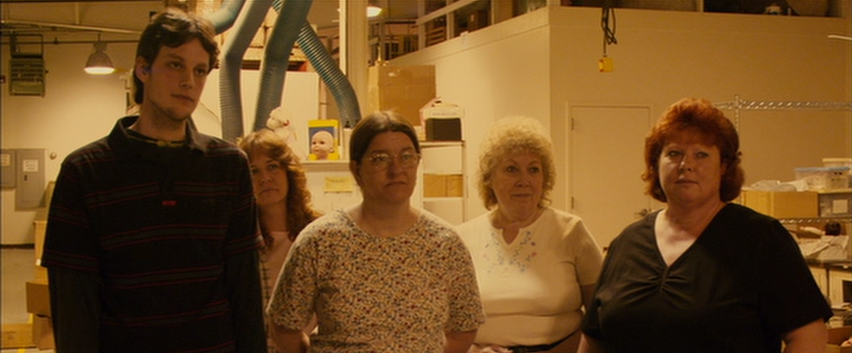

“We have got the physical evidence back from the lab and it implicates you in the death of Rose Hilyard.”
Bubble is Steven Soderbergh’s unromantic look at small-town America. In a career that has seen the director alternate between big budget Hollywood films—Traffic, Solaris, The Good German—and off-beat personal projects—Schizopolis, The Girlfriend Experience—the resulting oeuvre is of varying quality. The experiment here is noteworthy. Traveling to a small Midwest town, Soderbergh cast non-professional actors, used their homes as sets, improvised the dialogue, shot for only a few days, and then released the film in theaters simultaneously with the home video release. While it clearly lacks polish or plot wrinkles, what we are left with is a startlingly stark look at simple people who have tough lives and are driven to extremes because of it.
40-something Martha (Debbie Doebereiner) regularly gives rides to a young man named Kyle (Dustin James Ashley), taking him to the doll factory where they both work menial jobs. To even a mildly privileged person, their problems seem inconsequential. Kyle has no checking account, but he’s been saving up some cash to buy a car. Martha saw a commercial for a beach resort in Aruba but knows she will never get there. These details are relayed in short, clipped, conversations of the bored and weary, spoken to the listener only because the listener is who life has forced them to interact with.
Although Martha wishes to be out of the doldrums, when her stagnant life is interrupted by the arrival of a new co-worker, she finds that she is lost without her repetitive and meaningless habits. Rose (Misty Dawn Wilkins), a single mother, begins occupying more and more of Kyle’s time, asking him to take smoke breaks with her and eventually going on a date with him. Martha, who describes Kyle as her “bestest friend,” subtly throws suspicious looks at Rose, and doesn’t play nice when she is asked to babysit while Rose and Kyle spend a night out together.

Though Martha is genuinely helpful—giving rides, babysitting, teaching Rose how to make dolls—there is a veiled animosity that surfaces at times. Rose is anxious to get out of town; out of the dead-end place where no one can make money no matter how many jobs they work. In other words, she is a monkey wrench in Martha’s carefully constructed world of repetition and complacency.
There is not a grand story arc in Bubble. After babysitting while Rose and Kyle were out, Martha witnesses an altercation between Rose and her child’s father. Her rage at Rose’s disruption to her life boils over and she kills Rose. It doesn’t show the murder, and presents it as a mini mystery, but there is never really any question who the murderer is.
Soderbergh made a number of non-commercial decisions when making the film. From the casting of unknown faces to the nonsexual bedroom conversation between Rose and Kyle, whose brief romantic interest basically fizzles out as soon as the date begins, to the sparse soundtrack and short run-time. It was an interesting experiment, and one that has a deep resonance if you know people in situations like the ones these characters find themselves in.

That being said, without the murder, there isn’t much to drive the movie. The interactions capture countless real interactions that many of us have had in our daily lives. The genuineness of the conversations does not make them groundbreaking or particularly interesting. And although the murder is what keeps the movie interesting, it honestly seems out of place for Martha’s character, who seems to have spent her life gritting her teeth and bearing the onslaught of disappointments that life has thrown at her. Rather than strangling Rose she would have been more likely to swallow her tongue and go to McDonalds to eat her sorrows.
The cast, for their part, do a good job of inhabiting their characters. Only three actors to carry an entire feature (albeit a short one) is no small feat. I wouldn’t want to watch films like this all the time, but the small dose of realism contrasts nicely with the bombardment of artificial acting typically found in films. It’s not bad by any means, but certainly requires some adjusted expectations going in.